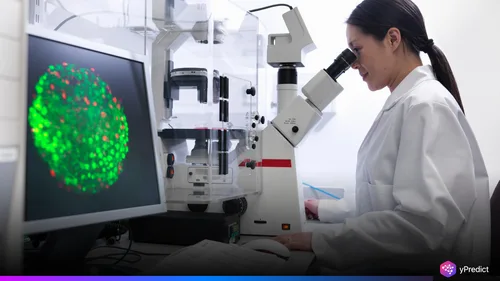
Artificial Intelligence is proving its power once again, this time beyond text and images. OpenAI and Retro Biosciences joined forces to show how AI in stem cell research can transform medicine. Their research shows that AI can design protein variants that rejuvenate human cells with efficiency levels never seen before.
The process of turning body cells back into stem cells has always been slow, complex, and uncertain. Scientists usually rely on a few proteins to trigger this change, but the success rate often remained low. Some researchers saw better results, while others struggled with inconsistent outcomes. With AI-driven analysis, the team created new protein variants that reprogram cells up to 50 times more effectively.
This milestone has far-reaching implications because stem cells are the basis of medical innovation. Not only can stem cells differentiate into multiple cell types, they can regenerate tissue, heal organs, and treat degenerative diseases associated with age. With AI facilitate this progression, what would otherwise take years in trial and error can now be accomplished in days. The addition of AI in stem cell research could considerably shorten the distance from discovery to utilization paving the way for expanded therapies.
Why Stem Cells Are at the Core of Medical Innovation
Stem cells hold the unique ability to transform into any specialized cell in the body, attracting massive attention in regenerative medicine. They can reshape treatment approaches, from repairing damaged heart tissue after cardiac arrest to regenerating brain cells lost to neurodegenerative disorders.
Scientists have worked for decades to unlock their potential, but methods for cell rejuvenation in regenerative medicine remained limited. Protein-based reprogramming offers results, but it requires strict control and often delivers very low success rates. These challenges slowed progress and kept many regenerative applications stuck in experimental stages.
AI now changes this landscape by enhancing and accelerating cell reprogramming. Researchers can use AI to streamline rejuvenation with greater efficiency, opening regenerative medicine to real-world breakthroughs.
How AI is Revolutionizing Cell Rejuvenation
The recent announcement by OpenAI and Retro Biosciences illustrates how AI can serve as a “discovery accelerator”. Instead of performing traditional trial-and-error methods, they trained an AI model to design novel protein variants. These proteins were tested, and found to significantly accelerate the rate cells were converted back to their stem cell state.
This is a big shift because cell rejuvenation typically takes years of incremental research. AI reduces this timeframe by taking a whole lot of biological data, and creating protein solutions in a handful of days. For the intersection of biology and AI, it is more than just a process improvement tool – this confluence is a pathway to entirely new discoveries. For the regenerative medicine community, this means quicker, cheaper, and more scalable solutions.
Implications for Regenerative Medicine and Human Health
AI’s influence in stem cell research reaches concurrence with efficiency. AI opens the door to exploring therapies aimed at ailments that have eluded the medical community for far too long. Think of the advances that will lead to the regeneration of brain tissue in patients with Alzheimer’s disease, or rebuilding a heart that has chronic failure with rejuvenated stem cells.
We could see breakthroughs in regenerative medicine for the blood and immune system, giving patients better outcomes after a course of chemotherapy or after suffering serious infections. AI may also help us find paths toward organ regeneration, reducing the need for organ transplants. The implications could reach even further, offering new ways to slow down and perhaps reverse aspects of aging altogether using advanced cell rejuvenation technology.
The Road Ahead for AI and Biotechnology
Though the results are very promising, this discovery is the very start of a longer journey ahead. Next research studies will start verifying the safety, stability and scaling up of protein applications designed by AI methods. Ultimately ethical treatments will have an unknown role in human cell manipulation going forward but at least we have a journey ahead that allows us to ask those questions at the forefront of the topic.
Regardless, the pathway is clear. AI in Stem Cell research has opened up a new pathway for what could potentially flip health care upside down. The speed with which AI will accelerate bench to bedside discoveries, regenerative medicine will get migrated from experimental treatment to application in the real world more quickly than we imagine. The initial engagement of OpenAI working with Retro Biosciences has demonstrated how powerful trans-disciplinary collaboration can be, and can provoke transformative advances for mankind.






